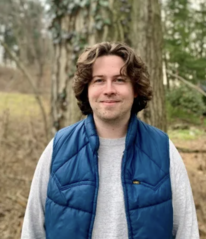
Institute on the Environment Postdoctoral Associate
Dr. Samuel Reed (he/him) has always had a passion for understanding change. Now, as an IonE Postdoctoral Fellow, he is working on two solutions-oriented projects that focus on understanding and sharing how we can best change in response to a warming planet. The first project, in partnership with the U.S. Geological Survey’s Midwest Climate Adaptation Science Center, investigates how we can help ecosystems adapt to a changing climate. The second project, in partnership with the Midwest Carbon Leadership Project, focuses on deep decarbonization within the energy and agricultural sectors.
As a National Science Foundation Graduate Research Fellow, Dr. Reed’s research focused on how certain combinations of disturbance, such as understory fire, canopy gaps, and white-tailed deer, can drastically alter ecological communities. Many disturbances are expected to become more common and likely to co-occur with a changing climate, making it critical that we understand their combined effects now, as multiple, interacting disturbances can lead to novel ecosystems. For instance, in one study Dr. Reed and colleagues found that combined deer browsing and tree harvesting can lead to sparse and less diverse forest communities that persist for well over a decade, posing new challenges and opportunities for land managers. In studying how different combinations of disturbance can lead to different ecosystems, we are able to start understanding the complexity land stewards face as the climate changes and disturbances become more common.
Dr. Reed is also passionate about science communication and building community. Throughout graduate school, he organized science communication workshops, roundtables, and research symposia, all of which crossed disciplinary boundaries and brought graduate students together. Now, he is bringing his research and interpersonal expertise to the Institute on the Environment to identify feasible solutions for mitigating and responding to a rapidly changing climate.
The University of Minnesota's Institute on the Environment is the institutional home of the Midwest CASC. Learn more about their postdoctoral fellowship program.
